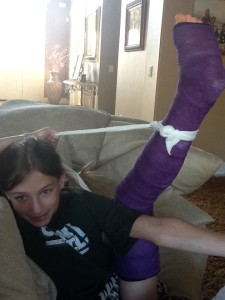Injuries: The Aftermath
You are at home and you get that dreaded call that your cheerleader has been injured. Maybe your cheerleader was practicing on your trampoline and you hear that scream that clearly means your child is injured. Or you head to the doctor after weeks/months of your cheerleader complaining that something hurts or just doesn’t feel right. Any of these situations can be terrifying and can add to lots of medical bills, lost time at work and missed school. What about the athlete and their mental well-being? How are they going to feel missing out on the sport they love?
In the beginning you get tons of questions and words of encouragement from coaches, teammates, friends with “Get Well” wishes and visits. What happens when your cheerleader is out for an extended amount of time, the season or forever? The visits stop, everyone goes back to their lives but you, your family and your cheerleader are stuck in limbo. If your child is anything like mine, they hate being out of the gym away from their teammates and closest friends; and then the boredom sets in. They go from being in the gym from 3 to 7 days a week to sitting at home with no contact with anyone from the gym at all. What are they supposed to do? As a parent what can you do?
You are the parent so you have to be in charge. First and foremost, follow your doctor’s orders. They have gone through all of the medical training, and they get paid a lot of money to give their “opinion”. If you don’t agree or feel your doctor is being too conservative or not conservative enough, then get a second opinion and look for Knee Replacement Alternatives in Westover Hills – QC Kinetix. Doctors are not perfect (though we are led to believe otherwise). You should be trusting of the advice you are given, but where your child is concerned be not only attentive, but be a researcher. Web MD, Google, and even the local library will give you tons of information on what the “diagnosis” is for your child. Get out a notebook and take notes and write down your questions. Some good ones are “what are the restrictions right now?” “is there any exercises she can do now to help with rehab?” and “what should I look for in the way of discomfort?” Keep that notebook for your reference. Take it with you to visits, when you make phone calls, and even for your own personal research. If a questions pops into your head write it down and then refer to it at the appointment.
Next, schedule visits for your child’s friends. Have some friends come over from the gym for a movie day or for lunch. Maybe even have them come over to help the athlete “work out” to the best of their ability. This gets your child included in things as well as their team mates helping them work out and get better. Even if it’s just once a week, do what you can to keep your child in touch with their friends. If possible, take them into the gym. Even if it is to just visit for a few minutes, to cheer on their teammates and to see their friends or to hand out thank you cards for all the well wishes, this will be a good reminder to everyone to see your child and not only see the injury, but the progress and keep the connection with the team and up to date on what is going on in the gym.
Another suggestion is to allow them to work around their injury. Can they still stretch? If the injury is in their arm(s) can they do exercises with their legs? Get some exercise bands or ankle/wrist weights. This will allow them to stay in the best shape possible and ready to go back once they are released. It will also help them to feel good about themselves and working towards a goal is always better then moping or feeling down about their current situation. Have some of their team mates over for a while to help if that works out in the schedule. A mini work out session is just what the doctor ordered to keep the bonds alive and for a little bit of fun as well!
Possibly help your athlete make spirit gifts for their team mates. They can make goody bags, door signs, cards with inspirational sayings and other small things. This will help the athlete feel as if they are a part of the team still and doing something productive. It will also keep them connected to their team. Some things can be very small, and some can be one big team gift. No limits other than the imagination and creativity of the child!
The last thing is to make sure your child understands that their current situation may seem hopeless and that it’s lasting forever (the set-backs can make this even worse) but that their situation is just that, temporary. Even if they are never allowed to cheer again, help them find something they can do and work towards another part of cheer. Maybe they are the “team manager” and helping the coach with things, getting water for the athletes, video-taping practices, whatever works to keep them involved. This will involve working with the coach and the gym to see if possible, but most would welcome the help! They might even be able to help out with some of the younger teams as opposed to their former team, but it still gives them connection to the gym and their friends. They are still a part of things (if that is what they choose) and gives them purpose in participating in what they enjoy doing.
Injuries can be devastating to cheerleaders and their families. If you are a friend or even an acquaintance of someone injured, I encourage you to reach out. It can be very lonely for someone that was once a part of something to tight-knit as a team to suddenly not be a part of it any longer. A simple private message/text to let a person know you are thinking of them goes a long way. We are all in this together! Let’s support each other; after all if it was your child injured you would want to know people cared not just for the first week but even two months or a year later. You wouldn’t want to lose the connection to something as grand as a cheerleading team; why have that happen to someone else?
http://www.heartofcheer.com/coaches/injuries-aftermath/http://www.heartofcheer.com/wp-content/uploads/2014/06/sydcookies-768x1024.jpeghttp://www.heartofcheer.com/wp-content/uploads/2014/06/sydcookies-150x150.jpegBlogCoachesHealthIndustryParentsemotional well being,inclusion,injuries,side lined
